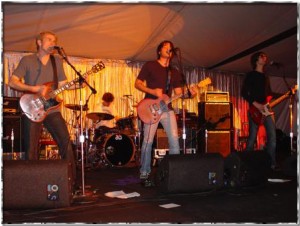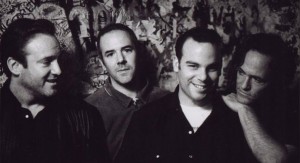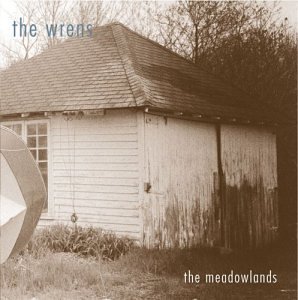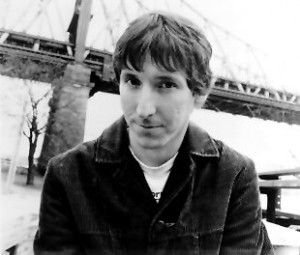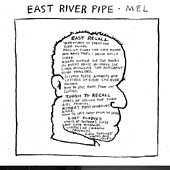Rosenbergs frontman David Fagin’s self-effacing wit surfaces quickly when I discover he’s busy with another call before we begin our interview.
“Maybe I should call later,” I tell him.
“No. I’m not busy. I’m just a typical loser who likes to hang out and watch porno,” he quips.
Born and raised in suburban Fair Lawn, New Jersey, Fagin and his band of “hard working road dogs” may be the most influential figures on the current underground pop scene. Strangely, that may have more to do with their business acumen than record sales.
Unlike typical artists out for the glory of a major record deal, the Rosenbergs have drafted a new model for the record industry. They’ve signed with maverick guitarist Robert Fripp’s independent Discipline Global Mobile label, where they’ll be guaranteed full ownership of their recordings and a much higher royalty rate in exchange for DGM getting a percentage of concert revenue, merchandising, and internet distribution. As a value-added bonus, the Rosenbergs will give away one free CD of Mission: You with each purchase.
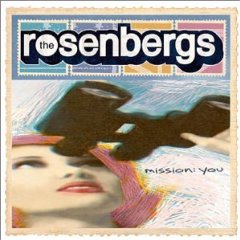 “It won’t hurt us financially one bit,” Fagin confidently mutters. “We’re hoping buyers will give the free one to friends to share their music file.”
“It won’t hurt us financially one bit,” Fagin confidently mutters. “We’re hoping buyers will give the free one to friends to share their music file.”
Furthermore, Napster is featuring the band on their front web page and is set to sponsor the Rosenbergs upcoming tour.
So what’s all the excitement about?
The Rosenbergs do more with bright, shiny guitar licks and magical harmonies than most power pop charmers. Hopeful teen-driven lyrics rife with melodic appeal penetrate the surface with youthful vigor. But there are just enough dark tones to keep Mission: You sounding ‘East Coast,’ specifically South Jersey/ Philly (like antecedents the Hooters or Smithereens).
The fun-tastic “Sucking On A Plum” and the synth-drenched dynamo “Paper And Plastic” open up the set with a determined immediacy. Bursting out of the speakers with full-on emotional impact, the shimmery “Houseboat” may well be the finest pop song to come out of Jersey since the Smithereens “A Girl Like You.” Its resonating guitars, sparkling harmonies, and spiraling synth clusters crescendo in sheer ecstasy.
On the dark side, melancholic self-doubt mires the otherwise punchy “A Little Lie,” a streamlined rocker aimed at some deceitful ex-lover. Closing Mission: You on a subtle, pensive note, the epic Brit-pop-influenced ballad, “Overboard,” shows off Fagin’s sensitive side.
Could Fagin, guitarist Joe Mahoney, bassist Evan Silverman, and drummer Joe Darone be the next ‘big thing.’ Time will tell.
Despite recent success, Fagin lost his girlfriend and claims he’s “currently homeless, crashing out at my sister’s pad or a friends’ place.”
DAVID FAGIN: Ameripop started as a collection of demos and had a charm that could never be replaced. It served its purpose and we’re hoping to get it re-released through Rykodisc.
Basically we’re named after my friends grandfather. I was over her house and he was talking about skiing and playing racquetball over the weekend. I was hoping I’d be that cool at eighty years old. So we took his name.
You got it. That’s what we were trying to do. We picked a song that starts off with big guitars, big drums, and big vocals and shows what direction the record would be heading in. That’s what we aimed for.
I guess it just comes out. All I know is there’s a child in all of us. Being in the music business and playing in a band makes you an eternal adolescent. I used to write really dark ‘why did you leave me’ ‘girl dumps guy’ lyrics, but in a down kind of way. Some girl who thought one of our records was cool asked ‘Have you ever thought of writing a song about going to get a slice of pizza?’ I said ‘No.’ All my songs then were like six-minute epics. That was a catalyst that took our songs in a more tongue-in-cheek direction. We started writing about going down to the corner store, sucking on a plum…whatever. That made it more fun. It was a weird, strange transaction from those first demos. We were a different band five years ago. The songs were verse-chorus-verse melodic, but were darker and less enlightened. Now we bounce around like monkeys.
I was a late bloomer. When I was thirteen years old it was Styx, REO Speedwagon, Journey, Kansas, and Rush. Then I got into Judas Priest’s Screaming For Vengeance. But I never was a metal head or hung out with the burnout’s. I was into Ratt and Dokken by seventeen. I discovered REM in ‘90 when Out Of Time came out. Then I went back to Murmur. That’s when my taste switched to Lindsay Buckingham, Mark Knopfler, and Screaming Trees. I got into Springsteen’s Born To Run in ‘87. A lot of people thought I listened to underground pop by 20/ 20 or the Shoes. But I never got into that until a few years ago. Recently, I started listening to a lot of female stuff, like Jonatha Brooke, Aimee Mann, and Juliana Hatfield. My favorite pop album of all time is the Posies’ Frosting On The Beater. I live for that record.
I love Howie from Thin Lizard Dawn, but they broke up. We’ve played with the Grip Weeds, Mike Viola & the Candy Butchers, and Fountains Of Wayne. I was primed for pop when Oasis and Fountains Of Wayne hit big. It took me a long time to write good songs. We searched around for a deal and were wondering why all our friends were getting signed instead. But everything happens for a reason. We saw each of them get dropped and pushed back. Nada Surf and Superdrag had lawsuit after lawsuit for a couple hundred thousand dollars in lawyer fees. The Honeydogs went four years without a record.
Absolutely. We’re not naive enough to think they’ll go away overnight. There will always be the artist that wants to sign on the dotted line for money up-front. They don’t care about a full-time career in music. In this day and age, you should think twice before you sign a crappy contract. With the internet, there’s a little union. They can’t keep bands segregated from one another.
Those bands probably had to sign away their entire lives and future earnings to Clive Davis. They’re basically puppets. What we’re doing with DGM and Rykodisc might create an alternative. We still own our music. Our ex-manager wanted to put up twenty grand to start making the record, but we didn’t want him to have a say in what songs we recorded. He’s a great guy, but he was definitely Modern Rock radio hit-oriented. He would have taken this record in a different direction. So he pulled his money out.
We were sitting there with no money or studio to make a record until we found someone on our e-mail list who gave us money to put a deposit down for the studio time. We recorded in Big Blue Meanie in Jersey City. They were so nice. We recorded well over $100,000 worth of time and they only took about half. They said, “we really like your band and the record so forget about the money.” Plus, we had time to make the record we wanted to make and to see what would fly. Without our producer, Dan (Iannuzzelli), it would probably have come out like a clusterfuck. He let us change lyrics, re-arrange choruses. Plus, we were going through ridiculous shit on the road. I had problems with my girlfriend. Our drummer’s father was dying of cancer. Our guitarist had financial problems. Evan had problems at home. Dan kept his wits about him and put it together like a ringmaster.
We like to play outside the New York/ New Jersey area. We’ve found everyone’s jaded. The Crayons and the Setzers – before they broke up – are really good bands. But a lot of people are in it for all the wrong reasons. The best pop scene we’ve seen is in Camdentown, England. We were hanging out with Blur, Supergrass, and Travis. Places like that are few and far between. These days it’s a vicious circle. There’s so many clubs, but 98% of them have shitty sound systems. Even in New York, the owners of some clubs would rather fix up their boat than put $2,000 into a PA system to respect the musicians. We were on the road last year for a long time and only got to meet a few guys who could walk the walk.
